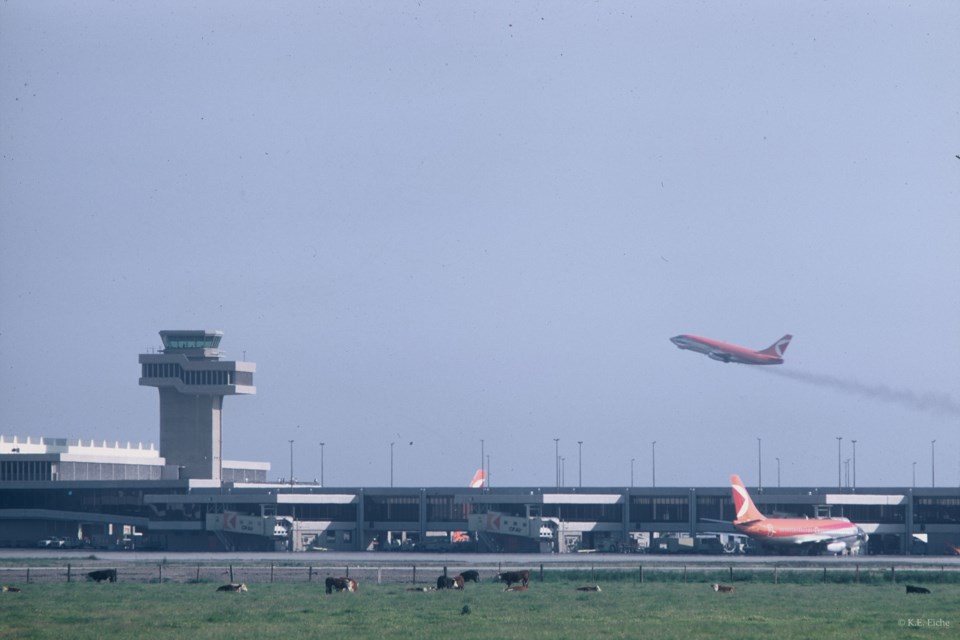The sun won’t be up for over an hour. I’m sitting on the deck with my early morning coffee, facing north, in the direction of Vancouver International Airport. Between me and the airport are more houses, the Fraser River, the No. 2 Road Bridge and lots of roads. All crammed into a few kilometres.
It should be dark out, but it isn’t — thanks to the glare from LED streetlamps and exterior house illuminations. It should also be quiet out, but it isn’t. There’s a distinct hum. It’s like a thick fog hovering over the ground, a fog composed not of water droplets but of noise.
Once the sun has risen and I’m active, my sense of hearing no longer has the advantage because other senses have come into play. Yet I continue to be acutely aware of the hum. In fact, it’s become more intense than before because now there’s more contributing to it — more cars and trucks rumbling along the roads, more air traffic, more construction activity with machinery grinding and howling. The noise is overwhelming.
Linguists disagree about the etymology of noise. Some say its root is in the Latin “nausea,” literally seasickness and by extension disgust, annoyance. Others claim noise derives from the Latin “noxia,” meaning crime, offence, fault. As an aside, the Italian for noise is “rumore,” which comes from the Latin “rumor,” dull noise, hearsay — and yes, you guessed it, the Latin “rumor” is also the root for our English word rumour.
A couple of years ago we happened to witness something significant and unprecedented in the lifetime of most of us. When the pandemic started to rage across the world, during the spring of 2020, people were requested to avoid travelling whenever possible and to avoid contact with others. Human activity was scaled back or even stayed, a situation for which scientists coined the word anthropause. Environmental pollution, which includes that of noise and light, dropped perceptibly. Humans benefitted from the decrease, but so, more importantly, did animals, from the smallest to the biggest, whether in the air or in the water.
Marine life depends on sound (from the Latin “sonus,” sound) for communication, hunting and navigation, using signals that have the capacity to travel thousands of kilometres through water. Now, however, these signals hit obstacles created by human noise pollution. “Ocean creatures ... live in a din previously unknown .... the blast of air guns, the needling and stab of sonar, and the throb of engines are new and, in most places, far louder than just a few decades ago.” Furthermore, in addition to noise pollution, there’s the problem of the volume of traffic — more ships mean more potential collisions with whales. Countless papers are being written on the subject, but so far there’s been little progress in finding even partial solutions. An exception is our Salish Sea, where B.C.’s whale protection unit patrols the area to make sure that people refrain from entering the “no-go zones.”
Birds make sounds — signals, calls, song — to find mates, to assess danger, to defend their territory. For them, survival depends on hearing and being heard. When the ambient noise level is high, their sounds have to become louder to compensate. Moreover, the noise caused by humans can distort or disrupt vital information being communicated by birds. It can have a negative impact on their normal social behaviour.
Noise pollution is especially disastrous during the period when birds are breeding because it can affect the number of eggs they lay and the size of the chicks that hatch. Spring and early summer are critical times for them, and unfortunately also the period when landscape crews deploy an arsenal of deafening tools — gas-powered lawnmowers, weed whackers, leaf blowers. As far as nature is concerned, these tools are weapons of mass destruction.
Richmond, you are ruthless when it comes to raising our taxes, why can’t you be equally ruthless in imposing a ban on gas-powered lawn maintenance equipment?
Sabine Eiche is a local writer and art historian with a PhD from Princeton University. She is passionately involved in preserving the environment and protecting nature. Her columns deal with a broad range of topics and often include the history (etymology) of words in order to shed extra light on the subject.



